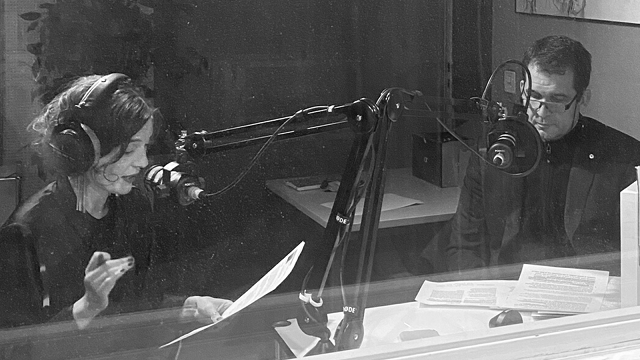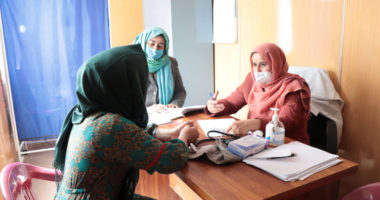As with many humanitarian crises in the past, the international armed conflict between Russia and Ukraine has revived heated discussions on the humanitarian principles and their relevance in contemporary armed conflict. We have all been reminded how the principles, in particular the principle of neutrality, can lead to misunderstanding and even outrage, and why they nonetheless remain such an essential compass and operational tool in highly polarized situations.
In this week’s episode of Humanity in War, podcast host Elizabeth Rushing navigated these murky waters with Nils Melzer, the director of ICRC’s International Law, Policy and Humanitarian Diplomacy Department, exploring how the humanitarian principles apply to contemporary armed conflict.
I’d like to start by framing why we’re having this conversation. The fundamental humanitarian principles of humanity, impartiality, neutrality and independence constitute the four common principles to international humanitarian law and the Red Cross and Red Crescent movement. But they go beyond that, referenced by Médecins Sans Frontières, UN resolutions, the European Union, the African Union and other humanitarian organizations. These are cardinal points of a compass crucial for dealing with the operational and ethical dilemmas of humanitarian actions.
This rich foundation of the principles begs the question: why now? The movement codified the principles in 1965 and followed them for decades before that. So why are we having a conversation now and going ‘back to the basics’ about the nature of and need for the humanitarian principles?
I think, as you said, the current discussion was triggered most recently by the international armed conflict between Russia and Ukraine, which has resulted in strong polarization of public opinion and where everyone – governments, organizations, cultural and religious institutions, even private corporations and individuals – are expected to take sides. This trend has put pressure on the Red Cross to take sides and has given rise to questions about the validity and legitimacy of its neutrality and impartiality, but also its confidential bilateral approach with all parties to an armed conflict.
Now, I think it’s important to remember that this is not the first time this has happened. It’s a recurring phenomenon that usually arises in connection with any kind of a watershed event that polarizes public opinion. Today, it may be the international armed conflict between Russia and Ukraine. But similarly, something like this happened after 9/11, when we had the so-called ‘war on terror’, which was also very strongly politicized and there was a lot of pressure to take the ‘right side’.
This is a very valuable point, because sometimes when this issue arises, people think this is the first time the principles have been called into question, and it’s not a new phenomenon at all. I teach a class on international humanitarian law, and each semester, this is the issue that comes up: the controversy surrounding neutrality and trying to really unpack what it means. I tell my students during that class that different humanitarian organizations have different comparative advantages and that the ICRC is arguably the most ‘strictly’ neutral, MSF a little less so, all the way to the name and shame advocacy or activist organizations that you and I have both worked for in the past. Would you agree with this explanation? And if so, how do you think we can strike the right balance?
Clearly there are plenty of organizations that do humanitarian work and address humanitarian needs in action. They may be defending also certain legal standards such as human rights law or refugee law, or the protection, as we do, of victims of armed conflict. But the working methods of each organization can differ because they really depend on their specific mandates, and they have to enable those organizations to actually fulfill their mandate.
In our case, the mission of the ICRC is to protect the lives and dignity of victims of armed conflict and other situations of violence and to provide them with assistance. So clearly our working methods must allow us to do that, to work in very dangerous and violent contexts of armed conflict on the battlefield on both sides of the frontline. We have to be able to negotiate with all parties. We have to be able to access victims, whether they be in prisons or in refugee camps, on both sides of the battlefield. We are unarmed and we cannot force our way in, so our presence has to be accepted and respected and our activities have to be understood and protected by all parties to the conflict. And this only works if they understand the benefits of our presence and that we do not take sides, that we remain neutral.
On that point, everything that you listed there that we ‘have to be able to do’ needs to be put in the context of where we’re doing this. We are operating in conflict zones. This is our stage. We know that emotions very understandably run high there. So how can we do better at explaining to people who are being directly impacted by the effects of armed conflict that neutrality is a non-negotiable to being able to protect and assist people affected by the effects of war?
You’re absolutely right to point out the emotional aspect of it. I think anyone who’s worked in a in a war zone knows that their emotions are affected as well. We’re not indifferent. Neutrality is not a question of being indifferent to what’s going on or of having sympathy or not – it’s not even a question of morality. It is a guiding star that really gives us a compass, that gives us a direction, how we can navigate the extremely violent and emotional environment of an armed conflict safely to be able to actually bring assistance and protection to victims of armed conflict.
I think that’s really important. It’s not a moral stance; it’s an operating principle. In an armed conflict, just try to publicly take sides with one party and then go to the battlefield and try to protect all victims of that conflict. It’s not possible.
Let’s explore another aspect of our work that often comes under scrutiny, and that’s our policy of confidentiality. This is a policy, not a principle, which means it doesn’t carry the same non-negotiable weight. In fact, there is an ICRC Doctrine, Doctrine 15, that outlines what actions our organization can and cannot take in the event of violations. It includes a fourth and final recourse of public criticism.
With this in mind, could you explain to us a bit how the ICRC policy of confidentiality interrelates with the fundamental principles? What’s the difference and why is all of this so important in practice?
Neutrality and impartiality are part of our identity. This is who we are as an institution. Just like a judge in a in a trial, as humanitarians in armed conflict, we can never take sides. We cannot fulfill our function if we ever take sides. And just like a judge, we may have a personal opinion, we may have personal emotions, but we cannot allow that to affect what we are doing professionally. Therefore, our neutrality is an institutional principle that is non-negotiable. We can never, ever take sides.
Confidentiality, on the other hand, is the way we do our work. It provides a protected space where we can interact confidentially and diplomatically with belligerents. We can express our concerns and transmit our observations to them, even if they concern violations of the laws of war. It allows for a protected space where we can interact with them without them being immediately exposed to the public and potentially even to judicial proceedings. If those confidential and bilateral interventions do not succeed in persuading the belligerent, if we have repeated violations of humanitarian law, if we have no other way of influencing those actors in a confidential and bilateral way, we may leave that path and escalate to the next level, which would be to try to share our concerns with other States that might be able to influence those belligerents, or international organizations that might be able to influence again in a confidential and bilateral way. If that doesn’t prove successful, then we can also go to the public and make a so-called declaration on the quality of our dialogue with the belligerents, which basically is a first step to the public to express our concerns without still naming and shaming. And the very last at the very end of that escalation process would be a public denunciation of violations of international humanitarian law.
So there is an escalation process, with our preference being to persuade parties to the conflict to respect international humanitarian law and to correct any misconduct on their own. And we stand ready to support them, to train them, to provide them with guidance on that. As long as that dialogue is fruitful and produces results, we will not go public.
To throw another wrench into the works, we can’t overlook the ubiquitous communications backdrop. Humanitarians are no longer working in a world of telegrams and newspapers, but rather an increasingly interconnected and complex web of human discourse where misinformation, disinformation and hate speech can and does spread like wildfire. So how can we, as the ICRC, communicate the humanitarian principles clearly in this age of 280 character limits and misinformation cutting us off at the knees? What’s our best strategy?
I think we have to understand where the criticism is coming from, and most of it may not even be malicious. It’s understandable. Emotions, as you said, are running high. We feel hurt by what we see in the media, by the news we get about all the suffering that’s caused by armed conflict. And we tend to take sides. That’s a human tendency. That’s natural, and that’s a normal reaction to an abnormal stress situation.
But we are professionals working in a very difficult environment. So we have to try to explain who we are and why we take those measures in the way we do. Criticism often comes from people who are far away from the battlefield, who may not be aware of what the consequences would be of us changing our stance. If we lose access to the victims, who will go and protect them?
I think we have to ask those who we assist and visit in prisons, in refugee camps and hospitals and battlefields all over the world whether they would like us to be neutral or whether they would like us to take sides and condemn publicly at the cost of losing access to them. We have to ask the mother – whose son we are keeping alive with her letters in prison – whether she would like us to be neutral and have access, or have at least a hope to get access to her son, or whether she would like us to take sides and lose that access. Because we’re the only ones who may be able to someday escort him out of prison alive.
I think this is really the trade off that we have to communicate. That’s what neutrality is about and that’s what’s impartiality is about. And this is what our mission is about and who we are.
Thank you for bringing in that very human element to the work, which is an excellent segue to my last question, about the principle of humanity. The purpose of the principle of humanity is ‘to protect life and health and to ensure respect for the human being. It promotes mutual understanding, friendship, cooperation and lasting peace among all people’. These are words of love, essentially.
We have colleagues who have been called naïve before for pointing to the principle of humanity in appealing to actors to ‘do the right thing’, instead of advocating for compliance by aligning an actor’s interest (for example political or economic) with the law. What is your experience from previous roles with the principle – and overall concept – of humanity and getting actors to comply with the law?
Thank you for that question. I think it’s a very important one, and there are many memories that come to mind from my interactions with armed actors in the field. I’d like to make two points here.
First, we often presume that without our intervention as the ICRC and the restraints of the law, military forces and their soldiers would engage in senseless destruction and killing, committing war crimes with impunity. We sometimes forget that the laws of war have developed from the battlefields and that throughout history it was the warriors themselves who developed very strict codes of honour of what conduct was considered to be acceptable in war. This has developed through time and certainly requires stronger enforcement. But my own experience is that soldiers actually often suffer from the lack of clear guidance on how to ensure they’re doing the right thing. They are often traumatized, not as much by the brutality of the armed conflict, but by the haunting question of whether they have actually done the right thing. So the principle of humanity is not some kind of an academic concept, but it is the one guiding star, as you say, which allows us to retain our sanity in the brutal environment of armed conflict. It’s really a common value that is shared by all of us.
The second point I’d like to make is that the principle of humanity that you read out also points far beyond just responding to humanitarian needs, but guides us towards promoting peace and conflict prevention to take a stronger stance also in preventing humanitarian needs and human suffering from arising in the first place. I think here we as an organization can also in the future take a slightly stronger stance without getting entangled in the politics of it, just from a purely humanitarian perspective.
See also
- John Lobor, Humanitarian principles in action: a Q&A with the South Sudan Red Cross, November 17, 2022
- Ariana Lopes Morey, What does ‘back to basics’ mean for gender and the fundamental principles?, September 1, 2022
- Fiona Terry, Taking action, not sides: the benefits of humanitarian neutrality in war, June 21, 2022
- Robert Mardini, Back to basics: humanitarian principles in contemporary armed conflict, June 16, 2022







Comments